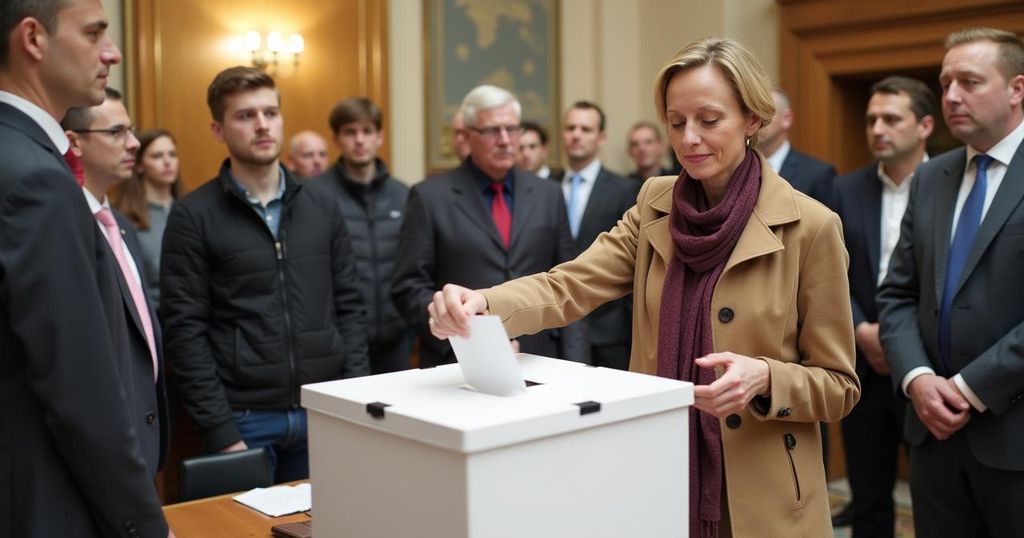Lithuanians voted on Sunday in the first round of parliamentary elections, potentially shifting governance from the center-right coalition led by Prime Minister Ingrida Šimonytė to the opposition Social Democrats and smaller left-leaning parties. Despite positive economic performance, public discontent appears rooted in pandemic response and migration issues. Polling indicates that no party may reach 20 percent of the vote, necessitating coalition building. The runoff is scheduled for October 27, as the electorate seeks change amid geopolitical tensions.
On Sunday, Lithuanians participated in the initial round of parliamentary elections, a pivotal event that could result in the opposition Social Democrats and smaller center-left parties unseating the current center-right governing coalition. Prime Minister Ingrida Šimonytė has led the government since 2020, but despite positive economic indicators such as significant personal income growth and low inflation rates within the European Union, public sentiment appears to reflect disappointment. Political analysts attribute this discontent to the adverse effects of the pandemic, including stringent COVID-19 measures and a growing number of migrants entering the country. Rima Urbonaitė, a political analyst at Mykolas Romeris University, noted, “There’s a lot of disappointment and discontent among voters. It is related to numerous crises and shocks and cannot be compensated by economic factors like positive change in purchasing power.” Criticism has emerged regarding Šimonytė’s handling of the pandemic, particularly concerning the perceived inadequacy of government support for businesses during lockdowns and challenges in ensuring equitable healthcare access. Furthermore, her management of migrant arrivals has drawn ire, as accusations have been levied against neighboring Belarus for orchestrating the influx of individuals, predominantly from Africa and the Middle East. Recent polling data from Vilmorus indicates that the Social Democratic Party, led by Vilija Blinkevičiūtė, is likely to secure the most votes, surpassing Šimonytė’s Homeland Union. Remigijus Žemaitaitis’s newly established party is expected to place between these two. Notably, it is anticipated that no single party will achieve more than 20 percent of the votes, thereby necessitating coalition-building to form a government. The Social Democrats have ruled out an alliance with Žemaitaitis’ party, indicating that multiple smaller parties may be required to establish a governing coalition. Amidst this election climate, sentiments from voters are shifting. Darius Mikalauskas, a 51-year-old teacher from Vilnius, expressed, “I have voted for the conservatives my entire life, but this year I’m thinking of giving my ballot to another good party, not to them. Šimonytė and the entire Homeland Union looks battered, worn out and they would better spend some time on the spare bench.” Analysts suggest that despite a potential leftward shift, Lithuania’s foreign policy—mainly directed by the President—might remain consistent, particularly given the ongoing concerns regarding Russia in light of its aggression in Ukraine. In 2020, Šimonytė achieved victory in the parliamentary elections and subsequently formed a coalition with two liberal parties. Approximately 2.4 million individuals are entitled to vote for 141 parliament members, with 70 lawmakers elected through party lists. The runoff election is scheduled for October 27, involving constituents from single-member districts participating in final selections between leading candidates.
The parliamentary elections in Lithuania occur amid a backdrop of existing economic stability, with positive indicators such as robust personal income growth and low inflation. However, the administration of Prime Minister Ingrida Šimonytë has been marred by discontent stemming from the handling of the COVID-19 pandemic and migration crises. As voters express a desire for change after years of conservative leadership, the election serves as a pivotal moment to reassess the political landscape. Analysts note that while economic performance is vital, it cannot wholly mitigate the public’s feelings of dissatisfaction, driven by recent crises. This situation is compounded by strategic regional concerns related to Russia, especially given the ongoing conflict in Ukraine, which influences public sentiment toward foreign policy decisions.
The initial round of parliamentary elections in Lithuania signals potential shifts in political power, with voter sentiment indicating a desire for change despite a backdrop of economic success. Prime Minister Ingrida Šimonytė’s coalition may face challenges in maintaining governance amid public dissatisfaction linked to pandemic management and migration issues. As the Social Democrats look set to gain ground, especially in coalition negotiations, the dynamics of Lithuania’s foreign policy and internal political stability remain closely watched. This election not only reflects individual voter sentiments but also the broader implications for the Baltic region in light of geopolitical tensions with Russia.
Original Source: www.pbs.org






